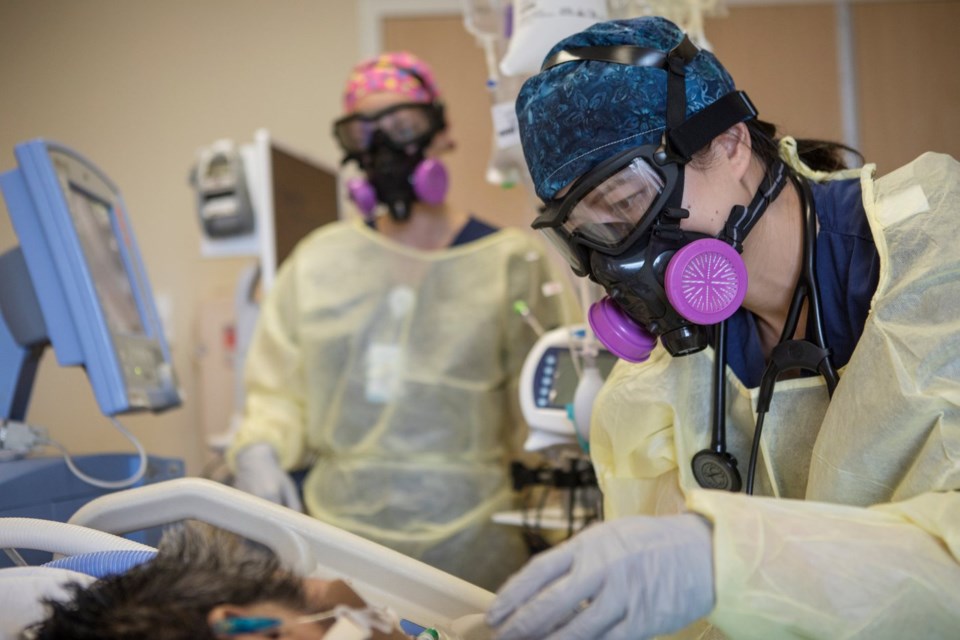A Sudbury engineer is on a mission to raise awareness about the efficacy of elastomeric respirators with the hope that local industries will be able to help in the fight against COVID-19.
Nicolas Smit has been spearheading a campaign that aims to get elastomeric respirators, otherwise known as P100 masks, into the hands of Ontario health-care workers since the beginning of the pandemic this spring.
“There’s a severe PPE shortage of N95 masks, which is resulting in health-care workers having to reuse them for days to weeks at a time. There is no need to do that because Ontario has updated their PPE guidelines and they have a stockpile of elastomeric respirators,” he said.
“After updating their guidelines, however, the government overlooked letting the public know. These respirators are now considered safe.”
Ontario Health was initially reluctant to approve elastomeric respirators for use in a health-care setting due to the disadvantages and risks associated with their design.
However, the agency has recently changed its tune and approved reusable elastomeric respirators for use amid PPE shortages.
Smit is now working to inform the public about the changes to Ontario Health’s guidelines, and to encourage local industry to start donating P100 masks to frontline workers once again.
“Originally, elastomeric respirators were considered unsafe because when the government looked into them in late March, they only looked at one type of elastomeric respirator and it had a one-way valve,” he explained.
“While they determined that the mask would protect the health-care worker, they were afraid that the one-way valve would let unfiltered air out, so a patient could potentially become infected if the health-care worker was infected. Because of that, they thought it would be too dangerous.”
Carol Hughes, MP for Algoma-Manitoulin-Kapuskasing, had written to the Minister of Health in April to ask about P100 masks and whether they were appropriate for use in a health-care setting.
She said that it is up to Health Canada to approve the use of these respirators, and the government makes changes to their guidelines according to what the experts say.
“This is a product that was approved as safe to use in different industries,” she said, meaning that these masks are considered ideal for use in construction environments.
Elastomeric respirators are meant to protect the wearer from exposure to dust, fumes, and hazardous mists and particulates such as lead and arsenic.
They are up to 99.97 per cent effective against oil-based particulates when worn properly.
They are commonly used in industrial settings such as the local mining industry. Smit used to use P100s regularly when he previously worked at a Vale smelter.
“In a health-care setting, it might offer better protection for the wearer, we’re just not sure if it offers better protection for the patient. As politicians, we leave these decisions up to the experts. They need to test the PPE to make sure it’s safe,” said Hughes.
Smit said that there are ways to maintain source control to address exhalation valve concerns, including placing a surgical, procedural or cloth mask over the valve to create a sterile environment, something that Ontario Health echoed in its new guidelines.
The National Institute for Occupational Safety and Health (NIOSH) in the United States has also recently approved the first elastomeric respirator without an exhalation valve.
“In an effort to optimize the long-term sustainability of PPE supply, shifting from disposable PPE to reusable PPE should be considered in contingency plans to ensure the health and safety of workers and patients,” said an Ontario Health representative.
“The stockpile of PPE that we have is in constant flux as we are constantly receiving and distributing product.”
Ontario released a set of guidelines called “Optimizing the Supply of Personal Protective Equipment During the COVID-19 Pandemic” on Sept. 22 that addresses the use of reusable elastomeric respirators.
The document states health-care workers can consider the use of NIOSH-approved reusable elastomeric respirators when disposable N95 respirator supply is low or during a period when N95 respirators are being conserved.
“If fit-tested and properly cleaned and disinfected between uses, reusable elastomeric respirators (half-mask or full facepiece) are as effective as disposable N95 respirators,” said Ontario Health.
“Reusable elastomeric respirators differ from disposable N95 respirators in that some users may experience issues with comfort/bulkiness, and interference with communication, and some people may feel claustrophobia or anxiety.”
The use of this kind of respirator in a health-care setting also requires support from local administrative and occupational health and safety teams to ensure fit-testing and standardized cleaning protocols.
If an employee presents with their own respirator, occupational health and safety units need to be engaged to support safe usage.
Now that the guidelines have changed, and more agencies are encouraging the use of elastomeric respirators in the event of an N95 shortage, Smit wants to see local PPE donations start up again.
“People that were donating them in the past, such as the mining industry, were not able to donate anymore because the government said in April that these respirators were too dangerous to use, so donations stopped,” he said.
“I hope that now the guidelines have been changed, more people will become aware that elastomeric respirators are a safe option, and that donations will be able to resume.”
Colleen Romaniuk is a Local Journalism Initiative reporter based out of The Sudbury Star. The LJI is funded by the government of Canada
